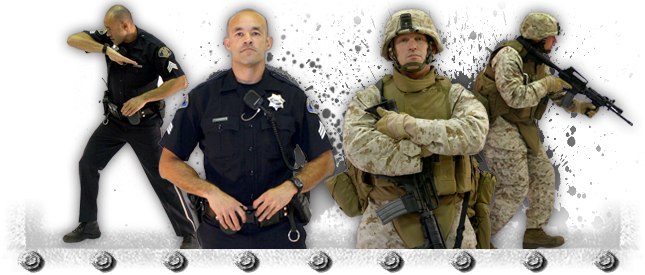The Military and Law Enforcement: A Thank You

Military and law enforcement personnel have had a long standing relationship with overlaps in training exercises, equipment, and, most important, personnel. It is not uncommon for a service member to make the jump from the military to law enforcement, as both professions look for the same characteristics; leadership, fidelity, chain of command, and team work are all common themes in both professions.
Veterans play in important part in our labor market, as they make up approximately 7.7%.1 Many of them go on to be engineers, doctors, lawyers, and other types of professionals, but these professions do not use the same mindset as the military's. Similar to our service members, police officers have a heightened sense of awareness and desire to help people, and they are goal-oriented. It is only fitting that many military personnel decide to enter the law enforcement world; they have already protected this country once, and they should be given the chance to do it again.
Law enforcement and the armed forces both stress the importance of discipline, punctuality, responsibility, team work, and decision-making skills. Both require their officers and enlisted personnel to be quick on their feet and have the ability to commit to their decisions, whether that decision is to make a drone strike or an arrest.
Probably the most important similarity between the two is the concept of team work. In law enforcement and the military, recruits are taught to work as a team, meaning that everybody must carry his or her own weight. In real-life situations, whether a tank is patrolling the streets of Baghdad or an officer is patrolling the streets of New York City, both law enforcement and the military personnel learn to rely on their teammates and to watch each other's back. This reliance on others creates a bond, or brotherhood, within a platoon or patrol squad that is difficult to replicate in an office setting. Being responsible not only for your own life but also for your platoon's or squads members' and knowing your teammates are responsible for your life—this type of teamwork doesn't happen every day in an office building, but for law enforcement officers, it is simply a part of the job.
With a similar brotherhood bond going from a platoon to a police squad, there is relatively little change in culture. Both professions have a similar command structure with somebody always in charge of somebody else. The chain of command is a key component in both the military and in law enforcement. Without it, the entire structure of both our armed services and law enforcement begin to break down. A chain of command creates accountability within each branch, as all personnel are responsible not only for their actions but also for the actions of their subordinates, which in turn creates a culture of responsibility and dependency on others. This culture transfers over well from the military to law enforcement and vice versa.
Many of the veterans at the Carlisle (Pennsylvania) Police Department conquer that their military training has helped them immensely in their police careers. Both Corporal Shull and Sargent Miller have explained how their military careers not only helped them to find work in law enforcement but also gave them the right mindset to handle police work, such as completing a mission. One corporal mentioned that being in the army taught him to always be alert, and that mindset has proved useful in both officers' police careers.
Corporal Shull is a combat veteran who served in Iraq, and Sargent Miller is a former Coast Guard Member. Both men have served this country as service members and continue to do so as police officers, just like the countless other police officers who have served in the military. It is important that we recognize these men who have served our country in not one career but in two. Thank you.
Thank you, Corporal Shull and Sargent Miller at the Carlisle Police Department.
Meghan Reynolds
Special Contributor
COPS Office
References
1 The Veteran Labor Force in the Recovery (Washington, DC: U.S. Department of Labor, 2011). http://www.dol.gov/_sec/media/reports/veteranslaborforce/.UAS Guidebook in Development | Reflections on the NIOT Gathering | Nez Perce Tribal Police Conference | LE Instructors and De-Escalation | Military and Law Enforcement | Hitting the Road with COPS
